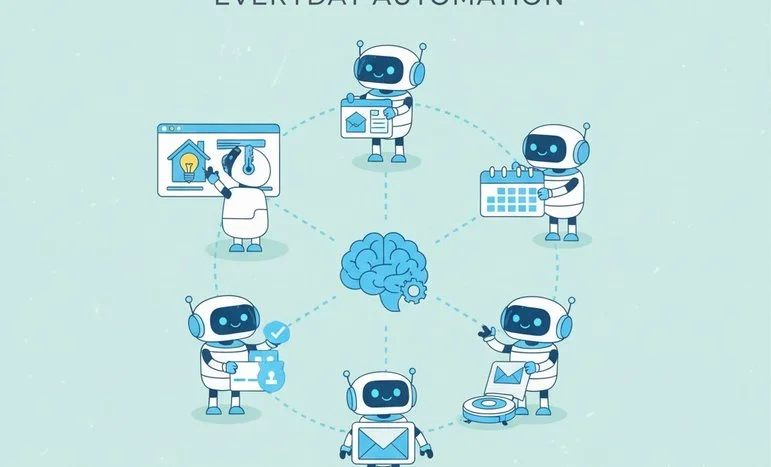
How to Use AI Agents for Everyday Automation
Introduction
AI agents are reshaping the way individuals and organizations handle daily tasks. These autonomous software programs can independently perform complex functions such as scheduling meetings, analyzing data, managing smart homes, or handling repetitive workflows—all without constant human oversight.
Amid the global surge in automation and virtual assistant technologies, interest in AI agents has grown by over 5,300%, reflecting a major shift toward practical, hands-free productivity tools. Whether for personal use or professional efficiency, these systems are becoming essential components of modern digital life.
What Are AI Agents?
AI agents are programs that use machine learning, natural language processing, and reasoning algorithms to perform actions based on defined goals or contextual understanding. They can:
- Interpret human instructions (via text or voice prompts)
- Take independent actions (e.g., sending emails, summarizing reports)
- Learn and improve performance over time
Unlike static automation scripts, AI agents are adaptive—they evolve through interaction, feedback, and data exposure.
Benefits of Everyday Automation
1. Time and Productivity Gains
AI agents handle routine tasks so users can focus on high-value activities. Examples include:
- Automating calendar scheduling
- Managing to-do lists and reminders
- Drafting and summarizing communications
2. Cost Efficiency and Accessibility
Modern AI platforms like Auto-GPT, GPT Engineer, and Open Interpreter allow non-technical users to set up automation systems without coding experience. This democratizes access to advanced productivity tools.
3. Smarter Decision-Making
AI agents can analyze data, generate insights, and recommend actions. For instance, a business manager can deploy an AI agent to monitor sales trends, or a student can use one to organize notes and deadlines efficiently.
How to Get Started with AI Agents
Step 1: Choose a Platform
Select a platform that aligns with your goals. Popular choices include:
- Auto-GPT – best for autonomous task execution
- OpenAI GPTs – versatile for conversational and workflow-based automation
- Hugging Face Agents – customizable with open-source flexibility
Step 2: Define Clear Goals
AI agents perform best with structured instructions. For instance:
“Schedule a weekly meeting every Monday at 9 a.m. and send reminders an hour before.”
A clear, outcome-based prompt helps the agent execute accurately.
Step 3: Test in Low-Stakes Scenarios
Before scaling automation, test the AI agent on simple tasks like organizing files or sending template emails. This helps refine parameters and identify potential risks.
Step 4: Monitor and Refine Outputs
AI agents learn through iteration. Continuously review performance metrics, make corrections, and adjust prompts to improve accuracy and reliability.
Everyday Use Cases
- Workplace automation: Manage team schedules, compile reports, and track project milestones.
- Personal productivity: Automate reminders, manage grocery lists, or summarize daily news.
- Smart homes: Integrate with IoT devices for energy management, cleaning, or security.
- Content creation: Generate outlines, social media posts, or analytics summaries.
Future Outlook
AI agents are advancing toward fully integrated digital ecosystems, capable of collaborating across platforms. As they evolve, privacy, transparency, and ethical programming will be crucial to ensuring responsible automation.
AI agents are revolutionizing everyday automation, offering adaptable, accessible tools for improving productivity and efficiency. With minimal setup and no coding required, users can streamline tasks, optimize decision-making, and achieve a better work-life balance.
As platforms like Auto-GPT continue to mature, the future of automation lies in intelligent collaboration—where humans and AI agents work together seamlessly to simplify modern life.
We appreciate that not everyone can afford to pay for Views right now. That’s why we choose to keep our journalism open for everyone. If this is you, please continue to read for free.
But if you can, can we count on your support at this perilous time? Here are three good reasons to make the choice to fund us today.
1. Our quality, investigative journalism is a scrutinising force.
2. We are independent and have no billionaire owner controlling what we do, so your money directly powers our reporting.
3. It doesn’t cost much, and takes less time than it took to read this message.
Choose to support open, independent journalism on a monthly basis. Thank you.













